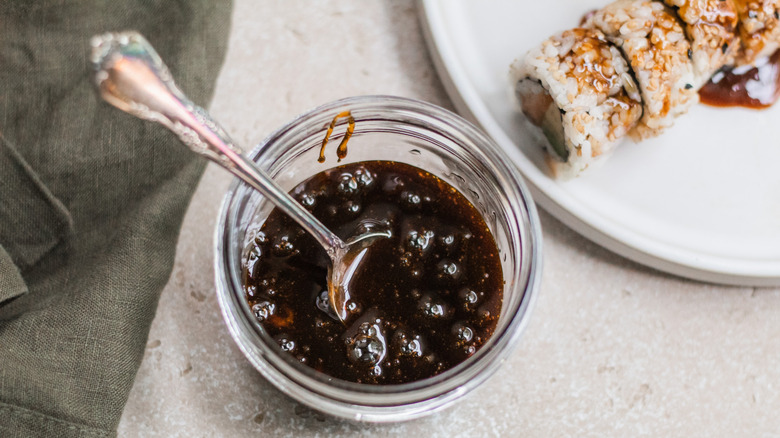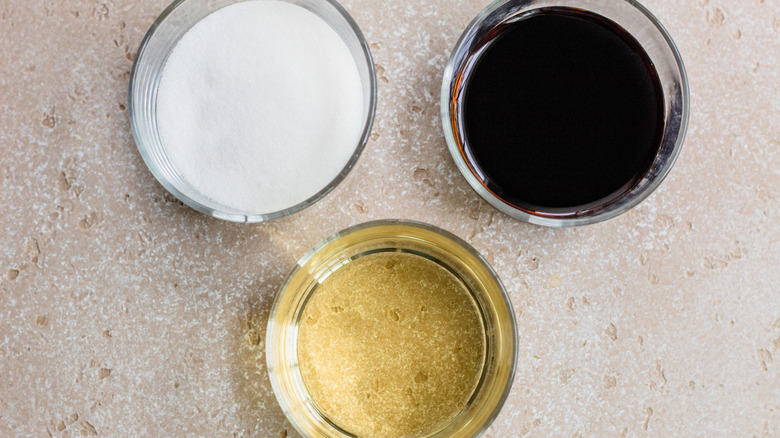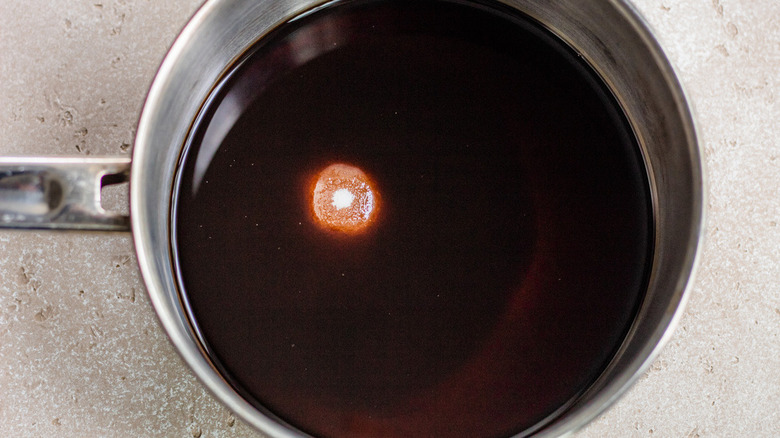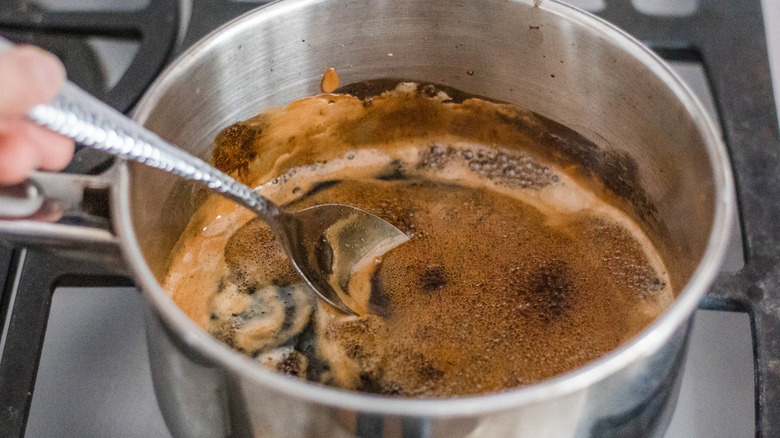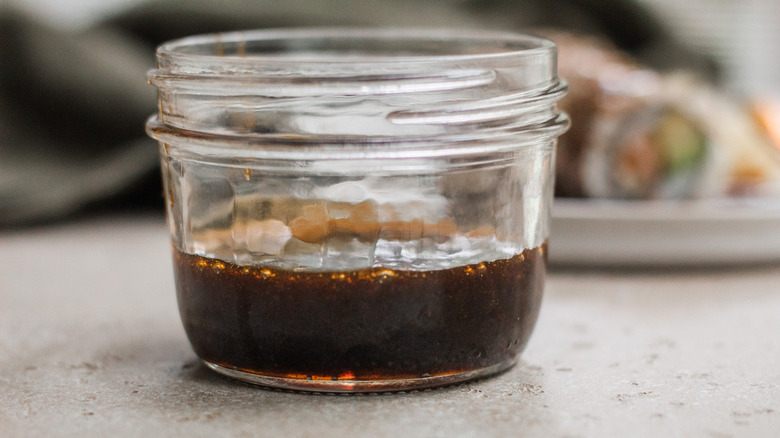Simple Eel Sauce Recipe
Some recipes have names that might seem a bit misleading, if not downright off-putting: frogmore stew, a stew that's not actually made with frogs, is one example, as is the equally amphibian-free toad in the hole.
Welsh rabbit (or rarebit), as well, is a perfectly innocuous dish of cheese-sauced toast without a single bit of bunny meat. This eel sauce is another such recipe. If you clicked on the recipe wondering how to make a sauce out of eels, we're sorry to disappoint you. While such a thing may exist out there somewhere, you won't learn how to make it here.
Instead, what you're getting is something recipe developer Jaime Shelbert describes as "a sweet, thickened soy sauce." She goes on to say that "Its sweet and salty flavor profile make it a versatile accompaniment to a variety of Japanese fare." As for the flavor, Shelbert says eel sauce is comparable to hoisin or teriyaki sauce, although it doesn't have the strong, almost molasses-like flavor of the former.
Gather your ingredients for eel sauce
To make this sauce, you need just a few ingredients. First, you'll need sugar — just plain old granulated table sugar. You'll also be using soy sauce (tamari can be substituted) and mirin. Shelbert notes that she sticks with just three ingredients to "[keep] it simple and classic," but she does say that sake could be added. You may wish to use this ingredient to replace part (or all) of the mirin.
Combine the ingredients in a saucepan
Mix the eel sauce ingredients together in a saucepan. While the amounts provided here make about 1 cup of sauce (sugar loses volume as it dissolves, plus some of the liquid cooks off), you can easily make a smaller or larger amount by simply combining equal amounts of all three ingredients. If you can't find a measuring cup or spoon, that's no problem whatsoever. Pour the liquids into a shot glass, a teacup, a bottle cap ... it doesn't matter a bit as long as you achieve (or at least approximate) the magical 1:1:1 ratio.
Cook the eel sauce
Turn the burner to medium and heat the sauce, stirring until the sugar dissolves. Let the sauce come to a boil and keep it boiling (keep stirring, too) for a minute. Turn the heat down to low and cook the eel sauce for another 10 minutes, until it starts to thicken. Shelbert notes that the sauce should reduce in volume by about a fourth, so if you're good at eyeballing stuff like that, you can use this as a guideline.
Cool and bottle the eel sauce
Let the sauce cool down for a few minutes as you decide what to do with it. As Shelbert observes, "The sauce will continue to thicken to a honey consistency as it cools." You can either use it right away or put it in a jar or bottle in the fridge for later use.
As to what to do with your eel sauce, you can top your grilled eel with it, of course, since this is the traditional use from which it takes its name. (Bet you were wondering when we were going to get around to explaining that.)
Not a grilled eel fan? It's probably just as well, as American eels are in short supply these days. Shelbert suggests, though, that you could also use eel sauce "as a condiment for sushi, as a marinade for meats and vegetables, as a topping for meat or tofu, [or on] veggie and rice bowls."
Simple Eel Sauce Recipe
No, eel sauce isn't a sauce made of eels. Rather, this simple sweet-and-savory eel sauce recipe is the perfect homemade condiment for your next sushi dinner.
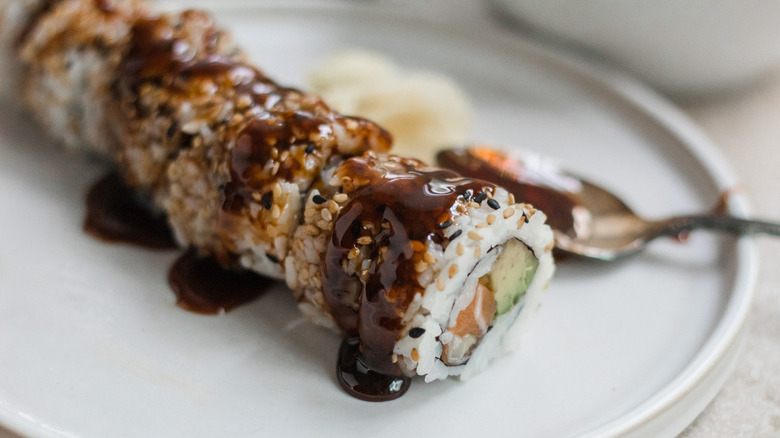
Ingredients
- ½ cup soy sauce or tamari
- ½ cup sugar
- ½ cup mirin
Directions
- Combine the soy sauce, sugar, and mirin in a medium saucepan.
- Cook the sauce over medium heat, stirring frequently until the sugar dissolves.
- Allow the sauce to come to a boil and cook, stirring, for 1 minute.
- Reduce the heat to low, and simmer the sauce for 10 minutes or until the sauce thickens and the volume is reduced by about ¼.
- Store the eel sauce in an airtight jar in the refrigerator unless you'll be using it right away.
Nutrition
| Calories per Serving | 76 |
| Total Fat | 0.1 g |
| Saturated Fat | 0.0 g |
| Trans Fat | 0.0 |
| Cholesterol | 0.0 mg |
| Total Carbohydrates | 14.0 g |
| Dietary Fiber | 0.1 g |
| Total Sugars | 12.5 g |
| Sodium | 875.9 mg |
| Protein | 1.4 g |
